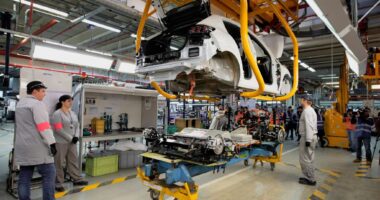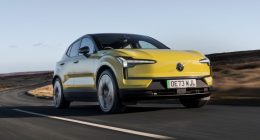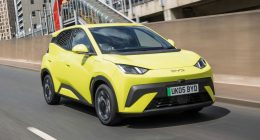The UK government is being urged to redouble its efforts to make the country electric vehicle (EV) ready between now and 2030 when the sale of new diesel and petrol-powered cars will cease.
Central to this, says the Society of Motor Manufacturers and Traders (SMMT), is to improve the charging infrastructure that currently exists in Great Britain and Northern Ireland while expanding this at the same time.
The SMMT’s Chief Executive has even gone as far as to say such change should be mandated by Prime Minister Boris Johnson if the UK is to stand any hope of achieving its net-zero carbon target.
Speaking at the SMMT’s 104th annual industry dinner last night, Mike Hawes said: “This industry does ‘delivery’. We will decarbonise road transport – cars by 2035, buses likely earlier, HGVs likely only a bit later.
“But as electric vehicle sales race ahead, on-street charging infrastructure is increasing slowly. We look to government to create the conditions – maybe mandate the conditions – to accelerate the infrastructure across the country as we need others to match our speed.”
According to the SMMT, a third of British-made cars are now electrified and forecasts suggest that more plug-in vehicles are expected to be registered this year than in the last decade combined.
“We’ve inspired people to buy these exciting vehicles but it’s so frustrating to find broken chargers, blocked charges and multiple apps”
SMMT President and Chairman Dr George Gillespie
SMMT President and Chairman Dr George Gillespie pointed out that “key challenges must be met” to sustain this upward trajectory, starting with the overall user experience of owning a hybrid or battery vehicle.
“We have invested billions in designing some of the most amazing electrified vehicles – over 115 zero emission capable vehicle models are for sale in the UK right now,” he told senior industry executives, media and government representatives at the event in London.
“We have inspired the public to buy these exciting vehicles in numbers never seen before, but here is the twist. It is so frustrating to find broken chargers, blocked chargers, multiple apps, confusing payment schemes.
“This is quickly going to turn a lot of people off electric vehicles and all our work in developing these fantastic vehicles will be wasted,” he added.
Calls were also made for improved competitiveness in the UK automotive sector. Apart from the on-going semiconductor shortages, the SMMT says the industry is being “hindered” by high energy prices, uncompetitive business rates and additional trade costs compared to its competitors in Europe and the rest of the world.
It added that close collaboration between the car industry – which employs some 155,000 people in highly skilled, well-paid jobs across the country – and government will be critical if it is to remain internationally competitive.
“We need access to skilled staff. We need free access to markets,” said Dr Gillespie. “We need the right government incentives to develop new technologies and continue to lead the world and help to deal with rising transport and energy costs.”









